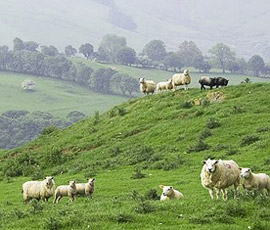Glastir funding for Welsh farmers at risk

Wales’ farmers have been warned they risk losing some of the country’s £89 million agri-environment funding and be forced to deliver green measures without compensation.
The warning from deputy farming minister, Alun Davies, comes after he revealed that just 1,698 farmers had 2012 Glastir contracts even though the scheme was given a complete overhaul to make it more attractive to farmers.
“The farming industry in Wales is aware that £89 million per annum is currently available for the delivery of Glastir and the outgoing agri environment schemes,’’ he said yesterday (February 1st). “If that funding is not taken up there will be many calls for that money to be used elsewhere.
“Glastir provides a mechanism through which the Welsh Government is able to compensate farmers for the action they take on helping to deliver what Wales must deliver in respect of a number of European Directives. The alternative to Glastir might well be legislative without the compensation payments that farmers in Glastir enjoy.’’
Around 5,000 farmers have expressed an interest in joining Glastir, Wales’ new agri-environment scheme, in its second year.
Several changes were made to the scheme last year and Mr Davies has agreed to go yet further. He confirmed that he would “listen to suggestions’’ on how it might be improved.
“This taking stock exercise will take place over the coming months and will be completed by early summer. I will make a further statement on the matter in due course,’’ he said.
At the top of his review list will be the way in which the scheme is communicated to farmers.
There are currently 154,014 hectares in Glastir, 107 Glastir Common Land Element contracts in place, involving 947 graziers, and 269 Glastir Woodland Creation contracts.
Of these 120 farmers have qualified for entry into the Agricultural Carbon Reduction and Efficiency Scheme (ACRES) in 2012 and around 500 for the Glastir Targeted Element (TE) in 2013.
“I believe that this is a good start and compares very favourably with other agri environment schemes in their first year of operation,’’ said Mr Davies. “That said, I also believe that much work remains to be done. We will not know the true success of Glastir until 2014, once the majority of the outgoing agri environment schemes agreements come to an end.’’
